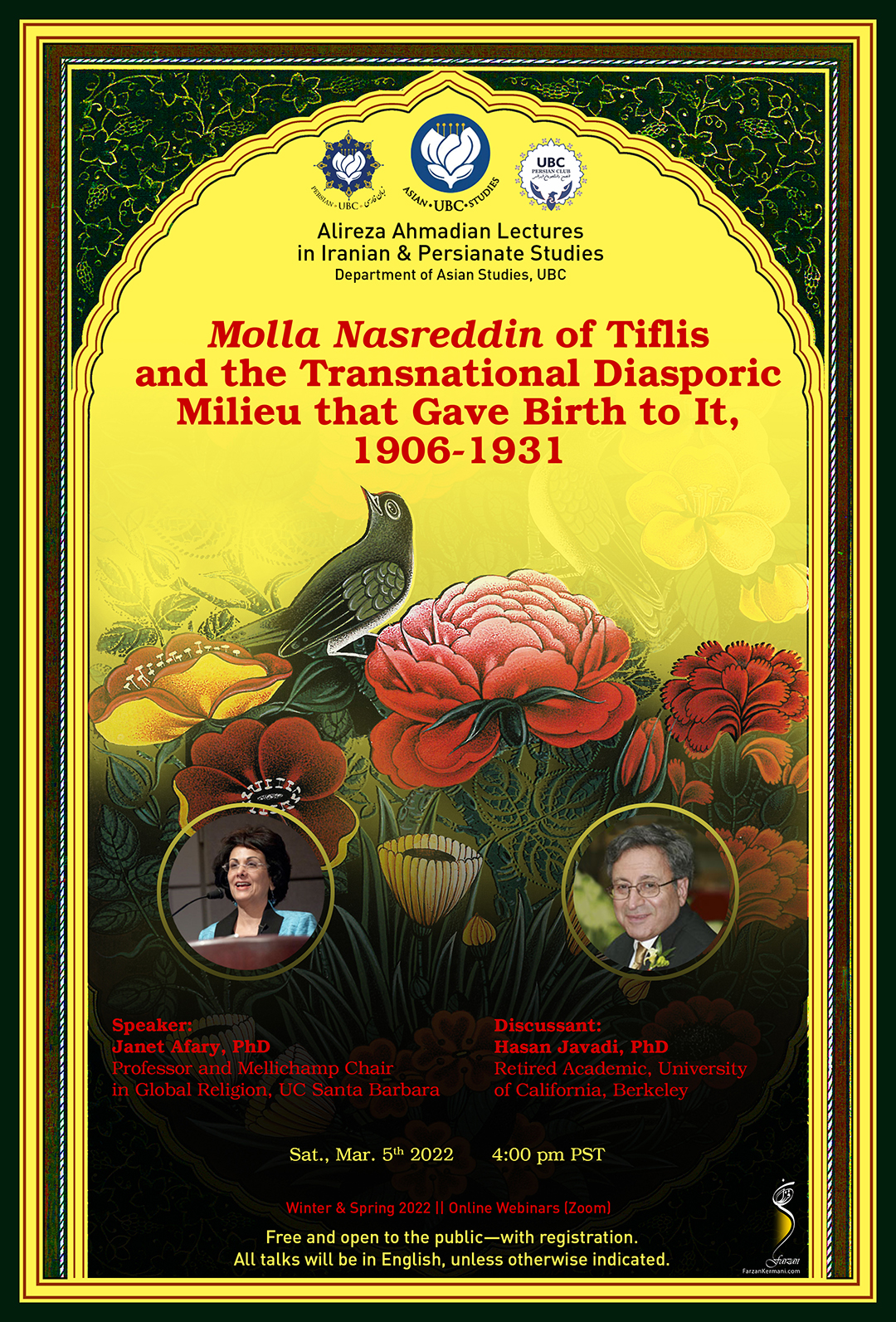

Poster design by Farzan Kermani
محیط دیاسپورای فراملی و تولّد نشریهٔ ملانصرالدین تفلیس (۱۹۰۶ – ۱۹۳۱)
سخنران: دکتر ژانت اَفاری، استاد گروه مطالعات دینی در دانشگاه کالیفرنیا، سانتا باربارا
طرفبحث: دکتر حسن جوادی، استاد بازنشسته، دانشگاه کالیفرنیا، برکلی
در اوایل قرن بیستم میلادی، گروهی از هنرمندان و روشنفکران منطقهٔ ماورای قفقاز برای شکل دادن به یک گفتمان اصلاحطلبی و ضداستعماری با تأکید ویژه بر اصلاحات اجتماعی و سیاسی، نشریهای با عنوان «ملانصرالدین» راهاندازی کردند. این نشریه با استفاده از فولکلور، هنرهای تجسمی و طنز، به دهها هزار نفر در جهان اسلام رسید و طرز تفکر یک نسل را تحت تأثیر قرار داد.
The event recording is now available:
The Alireza Ahmadian Lecture in Iranian and Persianate Studies present: Molla Nasreddin of Tiflis and the Transnational Diasporic Milieu that Gave Birth to It, 1906-1931 on March 5, 2022.
In the early 20th century, a group of artists and intellectuals in Transcaucasia reinterpreted a Middle Eastern trickster figure to construct a reformist and anti-colonial Muslim discourse with a strong emphasis on social and political reforms. Using folklore, visual art, and satire, their periodical Mollā Nasreddin reached tens of thousands of people in the Muslim world, impacting the thinking of a generation.
Guest Speaker
Janet Afary holds the Mellichamp Chair in Global Religion and Modernity at the University of California, Santa Barbara, where she is a Professor of Religious Studies. She is a historian of modern Iran and has a PhD in History and Near East Studies from the University of Michigan, where her dissertation received the Distinguished Rackham Dissertation Award. Previously she taught at the Department of History and the Program in Women’s Studies at Purdue University, where she was appointed a University Faculty Scholar. Her books include: Sexual Politics in Modern Iran (Cambridge University Press, 2009, winner of the British Society for Middle East Studies Annual Book Prize); The Iranian Constitutional Revolution: Grassroots Democracy, Social Democracy, and the Origins of Feminism (Columbia University Press, 1996, winner of Dehkhoda Institute Book Awardj; and (with Kevin B. Anderson) Foucault and the Iranian Revolution: Gender and the Seductions of Islamism (University of Chicago Press, 2005, winner of the Latifeh Yarshater Book Award for Iranian Women’s Studies); (with John R. Perry) Charand-o Parand: Revolutionary Satire in Iran (Yale University Press, 2016), Honorable Mention Lois Roth Persian Translation Prize.
Discussant
Hasan Javadi was born in Tabriz, Iran to a distinguished family of administrators and scholars. He has taught English and Persian literature at the University of Cambridge, Tehran University and the University of California at Berkeley. He is the author and translator of numerous books, including Satire in Persian Literature, and Persian Literary Influence on English Literature. For Mage he translated Obeyd-E Zakani: Ethics of the Aristocrats and Other Satirical Works. His translations include: Forough Farrokhzad’s Another Birth and Other Poems, and with Willem Floor, Abbas Qoli Aqa Bakikhanov’s The Heavenly Rose-Garden: A History of Shirvan & Daghestan; Evliya Chelebi’s Travels in Iran and the Caucasus, 1647 and 1654; and Wake Up Call: Memoirs of a Moslem Woman’s Struggle to Educate Her People, 1907-1931. He edited Letters From Tabriz: The Russian Suppression of the Iranian Constitutional Movement. Now retired, Dr. Javadi lives in the Washington DC area, where he is working on original scholarship and translations of Persianate literature.
Should you have any questions, please contact the Department of Asian Studies at Asian.Studies@ubc.ca.